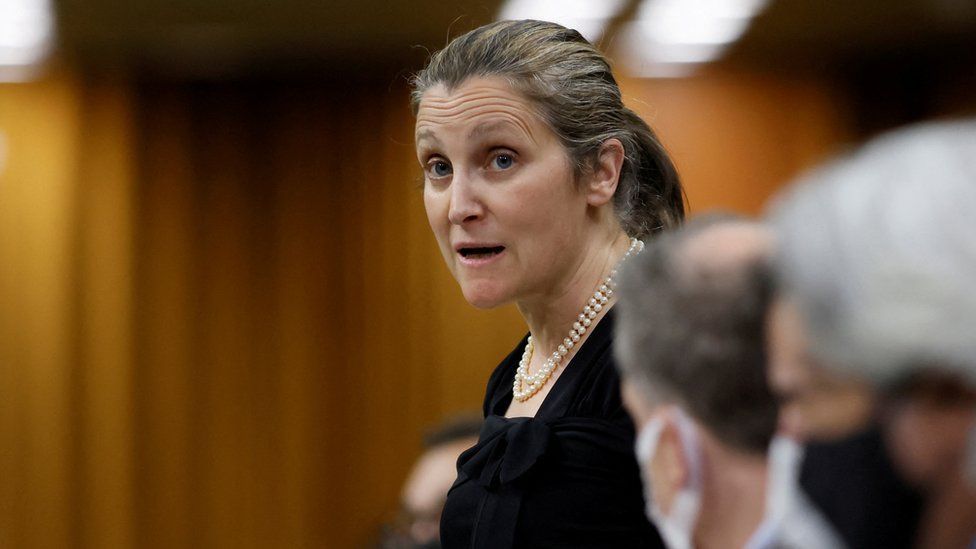
In Canada fears of ‘dangerous’ politics mounting

By Bernd Debusmann Jr
BBC News

Deputy PM Chrystia Freeland has been the subject of verbal abuse and threats.
Online threats, racist or misogynistic insults, public harassment and outright physical intimidation are just some of the behaviours that officials warn are changing the face of Canadian politics.
The issue was highlighted last weekend, when a man was filmed launching an expletive-laden verbal assault at Deputy Prime Minister Chrystia Freeland.
The incident – which was posted to social media – shows a man shouting at her as she approached a lift in Grande Prairie’s city hall during a visit to Alberta.
The man is seen calling her a “traitor” and using various profanities as he tells her to leave the western province. Police have since confirmed they are looking into the incident.
It comes after other public incidents, including Prime Minister Justin Trudeau being pelted by gravel by anti-vaccine mandate protesters during the last federal election and NDP leader Jagmeet Singh being verbally harassed outside an event earlier this year.
Some officials are ringing alarm bells warning that worse – maybe even dangerous – incidents are yet to come and are calling for better security for politicians.
Among those to have experienced these threats first-hand is Catherine McKenna, who served as a minister in Mr Trudeau’s cabinet between 2015 and 2021.
Ms McKenna said that the footage of Ms Freeland being accosted in Alberta was “all too familiar” for her after dealing with years of online threats and verbal abuse, which she said often took a distinctly misogynistic tone.
“Quite frankly, it was terrifying,” she said. “This is what happens, and it’s very dangerous.”
Canadian legislators from across the political spectrum have raised similar concerns.
Former federal Conservative cabinet minister Lisa Raitt, for example, harshly condemned the incident, tweeting that “physical intimidation is not a form of democratic expression”.
Conservative member of parliament Gerard Deltell said online that ministers should be given security “worthy of a G7 country”.
Cabinet ministers in Canada are not automatically assigned security, but can request it based on specific threats.
Ms McKenna said she fears that the country will one day see an incident reminiscent of that which took the life of Jo Cox, a labour MP in the UK who was murdered in 2016 by an extremist.
“Every single day I’m concerned about that,” she said. “That’s what we all worry about.”
In June, Public Safety Minister Marco Mendicino – who has himself faced death threats – announced that Canadian parliamentarians will be given mobile alarms after several politicians publicly criticised the Royal Canadian Mounted Police (RCMP) for not adequately addressing their security concerns.
While the Office of the Speaker of the House of Commons declined to give specific details about new security arrangements when contacted by the BBC, a spokesperson noted that the safety of parliamentarians is a “multi-jurisdictional matter” involving the RCMP, the Parliamentary Protective Service and the ministry of public safety, among others.
Collectively, they provide security assessments, provide equipment, advice and training and outreach with local police forces for politicians and staff.
Audrey Champoux, the press secretary for Mr Mendicino, said that authorities are taking threats “very seriously” and continuing to explore “other options” to help keep members of parliament safe.
“This is not a partisan issue, but rather a matter of public safety that goes to the security of our democracy,” she said.
Officials and legislators alike have said publicly that the threat level against politicians has risen over the last several years, while political discourse has become increasingly uncivil and polarised, particularly during the Covid-19 pandemic.
Steven Weldon, the director of the Centre for the Study of Public Opinion and Representation at Simon Fraser University in British Columbia, said that he believes the rise in harassment of politicians is – at least partly – the result of activists in Canada “learning” from the highly divisive politics of the US.
“There’s a sort of copying of behaviour,” he told the BBC. “There’s an aggressive, in-your-face kind of political activism that’s taken hold.”
This behaviour, Mr Weldon added, is most often a ploy for attention.
In the recent Alberta case involving Ms Freeland, Mr Weldon said that the culprits are likely “very happy” with the response and widespread coverage of the incident.
“It was a media shocker. That’s all planned,” he said.
“I don’t know if there’s increasing public acceptance of it, but [among] a certain group of anti-government activists in Canada, there is. It’s hard to tell what they’re looking for.”
Justin Trudeau was hit by gravel thrown by protesters during a campaign stop
The man in the video has since defended his actions in interviews with Canadian media.
According to Mr Weldon, public support for “in-your-face activism” in Canada remains “compartmentalised” to a particularly loud, but vocal minority, and is still considered fringe.
This harassment, Canadian observers note, often falls disproportionately on women, members of Canada’s LGBT community and ethnic minorities.
Ms Freeland has said the weekend incident will not stop her from returning to Alberta, which is “filled with kind and welcoming people”, adding “one unpleasant incident doesn’t change that”.
Ms McKenna, for her part, said that she fears that the increasingly nasty tone of Canadian politics, and failures to adequately protect politicians, may dissuade potential future politicians – particularly young women – from seeking out a career in public service.
“Most people get into politics because they want to build a better community…and we need vigorous debate,” she said. “But this isn’t what’s happening.”
“I you go into politics and your safety and that of your family are threatened, you’re going to say ‘why would I do that?’ That’s terrible for democracy.”
Source: https://www.bbc.co.uk/news/world-us-canada-62718193?at_medium=RSS&at_campaign=KARANGA


















